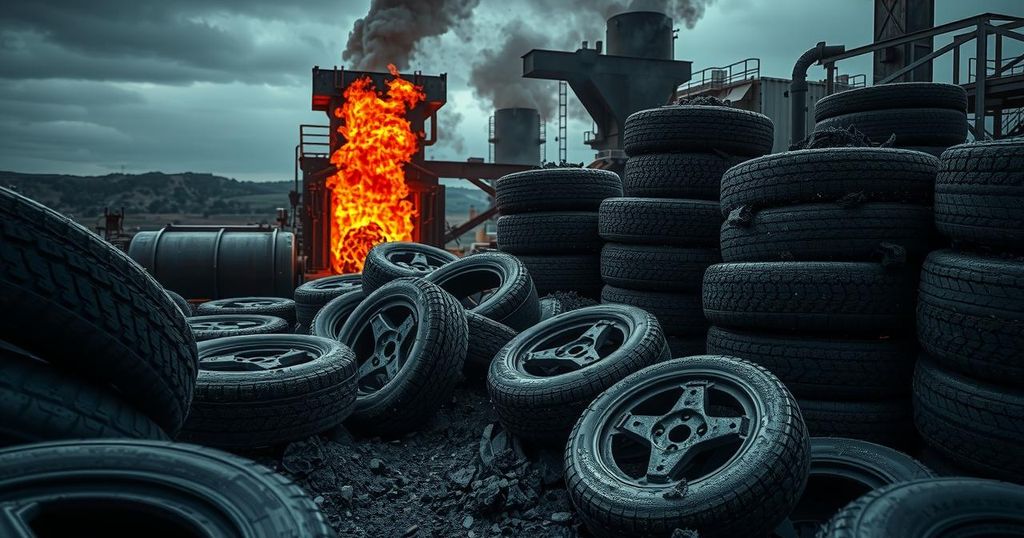Cars
ASIA, AUTOMOTIVE INDUSTRY, BBC, DEFRA, DEPARTMENT FOR ENVIRONMENT, FOOD AND RURAL AFFAIRS, ELLIOT MASON, ENVIRONMENTAL IMPACT, EUROPE, INDIA, INFRASTRUCTURE, MASON, NORTHAMPTON, ON, RECYCLING, RUBBER, RUSHDEN, TRA, TYRE RECOVERY ASSOCIATION, UK, UNITED KINGDOM, WASTE MANAGEMENT
Marisol Gonzalez
0 Comments
UK Tyre Export Practices Lead to Health and Environmental Crisis in India
The BBC exposed that millions of UK tyres exported for recycling are incinerated in India, causing severe health and environmental issues. Despite claims of stringent controls, many tyres end up in illegal operations rather than licensed facilities, raising urgent concerns over the recycling process and the role of regulatory bodies in addressing this crisis.
The BBC has uncovered that millions of tyres exported from the UK to India for recycling are actually being incinerated in makeshift furnaces, leading to severe health issues and environmental destruction. Industry insiders confirm widespread knowledge of this practice within the sector. Elliot Mason, who owns a leading tyre recycling facility, emphasizes that the industry is well aware of these illegal activities.
Campaigners and organizations such as the Tyre Recovery Association (TRA) contend that the UK government is cognizant of its severe reputation for exporting waste tyres improperly. Defra claims to maintain stringent regulations for exporting waste tyres, including severe penalties for violations, yet these regulations appear ineffective in preventing the illegal trade.
Upon replacing tyres, garages typically impose a recycling fee ranging from £3 to £6, intended to ensure proper recycling either domestically or abroad. Facilities like Mason’s Rubber World contribute significantly, processing approximately 50 million waste tyres annually, half of which are exported to India despite expectations that they would be processed at legitimate plants.
Before export, tyres are compressed into bales. Mason notes that while these bales are claimed to be processed in compliant facilities, an estimated 70% end up in informal plants conducting pyrolysis, which entails cooking tyres under extreme conditions to extract useful materials.
The BBC, in collaboration with SourceMaterial, tracked the journey of exported UK tyres to India, revealing their arrival at a compound where they were stacked for processing. Drone footage documented these tyres being sent to facilities known for pyrolysis, often situated in rural areas where environmental regulations are lax. Despite official documentation indicating proper recycling, the reality is that many tyres are illegally processed in hazardous conditions.
Reports from both local villagers and environmental experts highlighted health and environmental issues resulting from these illegal pyrolysis operations. Persistent complaints about respiratory problems and ecological degradation were noted around Wada, where an explosion at one facility resulted in fatalities. Though the local government has begun shuttering illegal operations, the issue persists.
Elliot Mason pointed out the profitability of exporting tyres to India instead of investing in local shredding operations, noting that sizeable firms like his adhere to strict regulations while smaller entities exploit exemptions that permit higher exports. Investigations revealed multiple dealers exceeding legal export limits and knowingly misrepresenting the intended purpose of their shipments.
Defra is contemplating reforming waste exemptions to address these illegal exports. Meanwhile, other countries such as Australia have implemented outright bans on baled tyre exports after discovering similar abuses. Advocates like Georgia Elliott-Smith urge the UK government to recognize this issue as a significant environmental and health crisis and to classify such tyres as hazardous waste.
The investigation reveals the alarming reality of UK tyres exported to India, which are often improperly reprocessed in dangerous conditions. Despite claims of stringent regulations from the UK government, many tyres do not reach their intended recycling facilities and contribute significantly to pollution and health hazards. The need for reform and strict adherence to recycling laws is evident to safeguard both domestic and international communities, as well as the environment.
Original Source: www.bbc.com




Post Comment